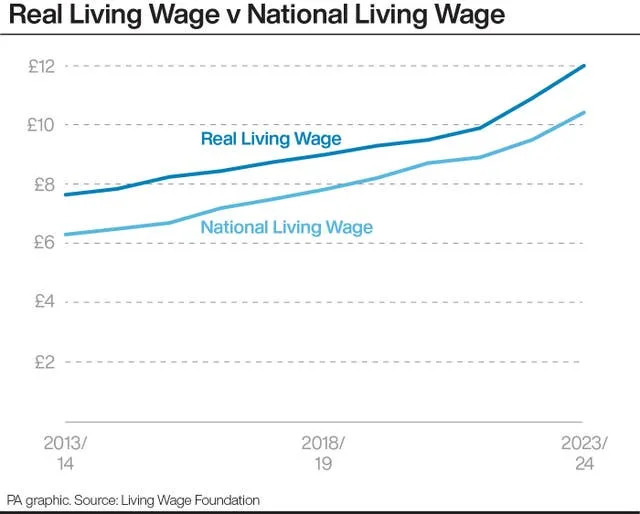Pedro Goncalves
·Finance Reporter, Yahoo Finance UK
Mon, 23 October 2023
Low-paid workers remain at the sharp end of the cost of living crisis, according to the Living Wage Foundation. Photo: PA/Alamy (Gary Hider)
More than 460,000 people across the UK will see their "real living wage" rise by 10% amid the ongoing cost of living crisis.
Rates will increase to £12 an hour outside London — a rise of £1.10. In the capital it will rise to £13.15 an hour — a £1.20 increase from this Tuesday.
The rate, which is voluntarily paid by some employers, applies to everyone over the age of 18 and compares to the statutory national living wage for over-23s of £10.42 an hour.
Over 460,000 people, employed by 14,000 employers, receive the real living wage, with the retail, care and hospitality sectors accounting for a large number of these jobs.
“As inflation eases, we cannot forget that low-paid workers remain at the sharp end of the cost of living crisis,” Living Wage Foundation director Katherine Chapman said.
Read more: The best and worst UK banks for current and savings accounts
According to the foundation, a full-time worker earning the new real living wage will earn £3,081 more per year than someone on the current government minimum, and an additional £5,323 in London
“Low-paid workers continue to struggle with stubbornly high prices because they spend a larger share of their budget on food and energy. These new rates are a lifeline for the 460,000 workers who will get a pay rise,” Chapman added.
Research by the foundation found that, despite easing inflation, the cost of living crisis is far from over for low-paid workers, with 50% worse off than a year ago.
More than two in five low-paid workers say they regularly use a food bank and almost as many report falling behind on household bills, according to the Living Wage Foundation.
The real living wage is decided by the Living Wage Foundation and the rate is set based on current living costs, such as the cost of bills. It is different from the national living wage, an "obligatory" minimum wage businesses pay workers in the UK aged 23 and over for each hour they work.
Read more: Tesco and Sainsbury's using 'dodgy tactics' on promotions, says Which?
Real living wage employers include the Royal Albert Hall, Aston University, and the Excel Centre, as well as about half of the FTSE 100 (^FTSE) companies including insurer Aviva (AV.L).
UK chancellor Jeremy Hunt has confirmed that from April next year, the national living wage will rise from the current £10.42 an hour to at least £11 an hour. The increase would see the annual earnings of a full-time worker earning this amount increase by £1,000 a year.
Real Living Wage to rise 10% amid cost-of-living crisis
Alan Jones, PA Industrial Correspondent
Tue, 24 October 2023
The voluntary so-called Real Living Wage is to increase by 10% to reflect the ongoing cost-of-living crisis for workers, it has been announced.
More than 460,000 people working for 14,000 employers who pay the rate will receive a wage rise.
The Living Wage Foundation said its rates will increase to £12 an hour outside London – a rise of £1.10 – and to £13.15 an hour in the capital – a £1.20 increase.
The foundation said the 10% rise, coming into effect on Tuesday, reflects “persistently high costs” for low-paid workers.

(PA Graphics)
The voluntary rate, which applies to everyone over the age of 18, compares to the statutory National Living Wage for over-23s of £10.42 an hour.
A full-time worker earning the new Real Living Wage will earn £3,081 a year more than someone on the current government minimum, and an additional £5,323 in London, according to the foundation.
Its research found that, despite easing inflation, the cost-of-living crisis is far from over for low-paid workers, with 50% worse off than a year ago.
More than two in five low-paid workers say they regularly use a food bank and almost as many report falling behind on household bills, said the foundation.
Living Wage Foundation director Katherine Chapman said: “As inflation eases, we cannot forget that low-paid workers remain at the sharp end of the cost-of-living crisis.
“Low-paid workers continue to struggle with stubbornly high prices because they spend a larger share of their budget on food and energy.
“These new rates are a lifeline for the 460,000 workers who will get a pay rise.”
The foundation said record numbers of employers are signing up to pay the voluntary rates.
Unison general secretary Christina McAnea said: “This is good news for hundreds of thousands of low-paid workers whose employers do the right thing. That’s pay them a decent wage.
“But many more providing essential public services will miss out. These employees include care workers, who’re often on poverty pay, in a sector already struggling to fill record vacancies.
“Today’s increase means thousands of workers employed by the NHS on the lowest pay bands – like porters, cleaners, domestics and security staff – will be significantly short of the new rate.
“The Government must follow suit and boost the minimum wage so millions are better able to weather the cost-of-living pressures causing such deep financial pain.”
No comments:
Post a Comment